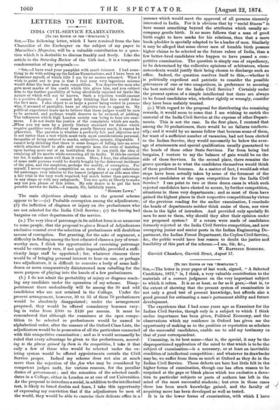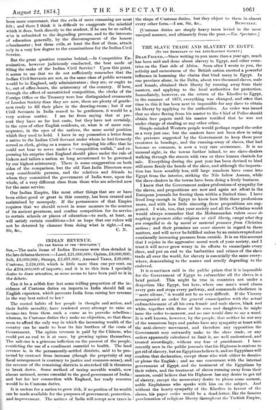[TO THE EDITOR OF THE "SPECTATOR."]
SIR,—The letter in your paper of last week, signed, "A Selected Candidate, 1873," is, I think, a very valuable contribution to the materials of a correct judgment on the very important Subject to which it refers. It is so at least, as far as it goes,—that is, to the extent of showing that the present system of examination is not only a good test of present knowledge, but affords also a good ground for estimating a man's permanent ability and future development.
The experience that I had some years ago as Examiner for the Indian Civil Service, though only in a subject to which I think undue importance has been given, Political Economy, and the. observations which my residence in Oxford has given me the opportunity of making as to the position or reputation as scholars. of the successful candidates, enable me to add my testimony to. that of your correspondent.
Cramming, in its best sense—that is, the special, it may be the- disproportioned application of the mind to that which is to be.the. subject of examination—is a necessary, or at least an inevitable- condition of intellectual competition ; and whatever its drawbacks. may be, we suffer from them as much at Oxford as they do in the. Indian Civil Service. Those defects are here but little felt in the higher forms of examination, though one has often reason to be surprised at the gaps or blank places which too exclusive a devo- tion to particular subjects or parts of authors has left in the mind of the most successful students ; but even in those cases there has been much knowledge gained, and the faculty of acquiring more has been developed as well as tested.
It is in the lower forms of examination, with which I have
been more conversant, that the evils of mere cramming are most felt ; and there I think it is difficult to exaggerate the mischief which it does, both directly to the student, if he can be BO called, who is submitted to the degrading process, and to the interests of education generally, by the discouragement of the honest schoolmaster; but these evils, at least the first of them, attach only in a very low degree to the examinations for the Indian Civil Service.
But the great question remains behind,—Is Competitive Ex- atnination, however judiciously conducted, the best mode of filling the ranks of the Indian Civil Service? Upon this point, it seems to me that we do not sufficiently- remember that the Indian Civil Servants are not, as the same class of public servants would be in England, only administrators; they are, or ought to
out of office-hours, the aristocracy of the country. If here, through the effect of unrestricted competition, the clerks of the Foreign Office or the Treasury were less distinguished ornaments of London Society than they are now, there are plenty of gentle- men ready to fill their place in the drawing-room ; but if our Civil Servants in India ceased to be gentlemen, it would be a very serious matter. I am far from saying that at pre- sent they have so far lost caste, but they have not certainly, in the eyes of other English residents, or, what is of more con- sequence, in the eyes of the natives, the same social position which they used to hold. I have in my possession a letter from a native to the Indian Civil Servant under whom he had formerly served as clerk, giving as a reason for resigning his office that he could not bear to serve under a "competition wallah," and ex- pressing his surprise that England should place under the rule of tinkers and tailors a nation so long accustomed to be governed by our highest aristocracy. There is some exaggeration on both sides of the comparison, but the old East India Directors were very considerable persons, and the relatives and friends to whom they committed the government of India were, upon the whole, of a very different class from those who are selected now for the same service.
Our Indian Empire, like most other things that are or have been either good or great in this country, has been created and maintained by monopoly. If the permanence of that Empire requires that we should revert in some measure to the sources of its ancient greatness, and confine competition for its service to certain schools or places of education—to such, at least, as will satisfy certain conditions—let us hope that our rulers will not be deterred by clamour from doing what is right.—I am,































 Previous page
Previous page